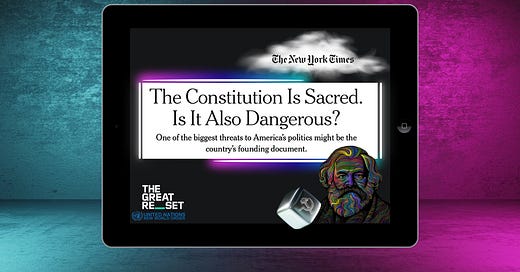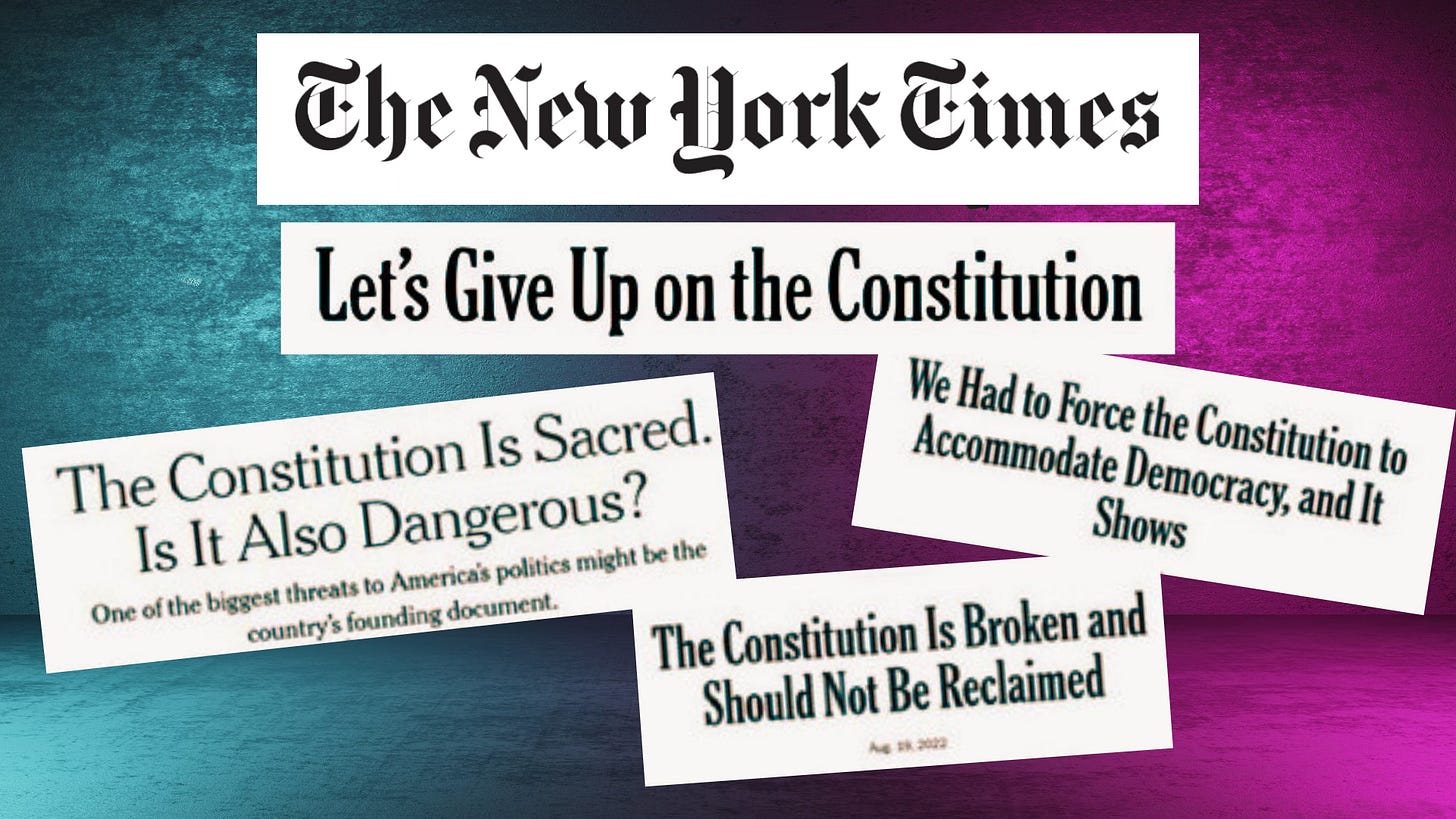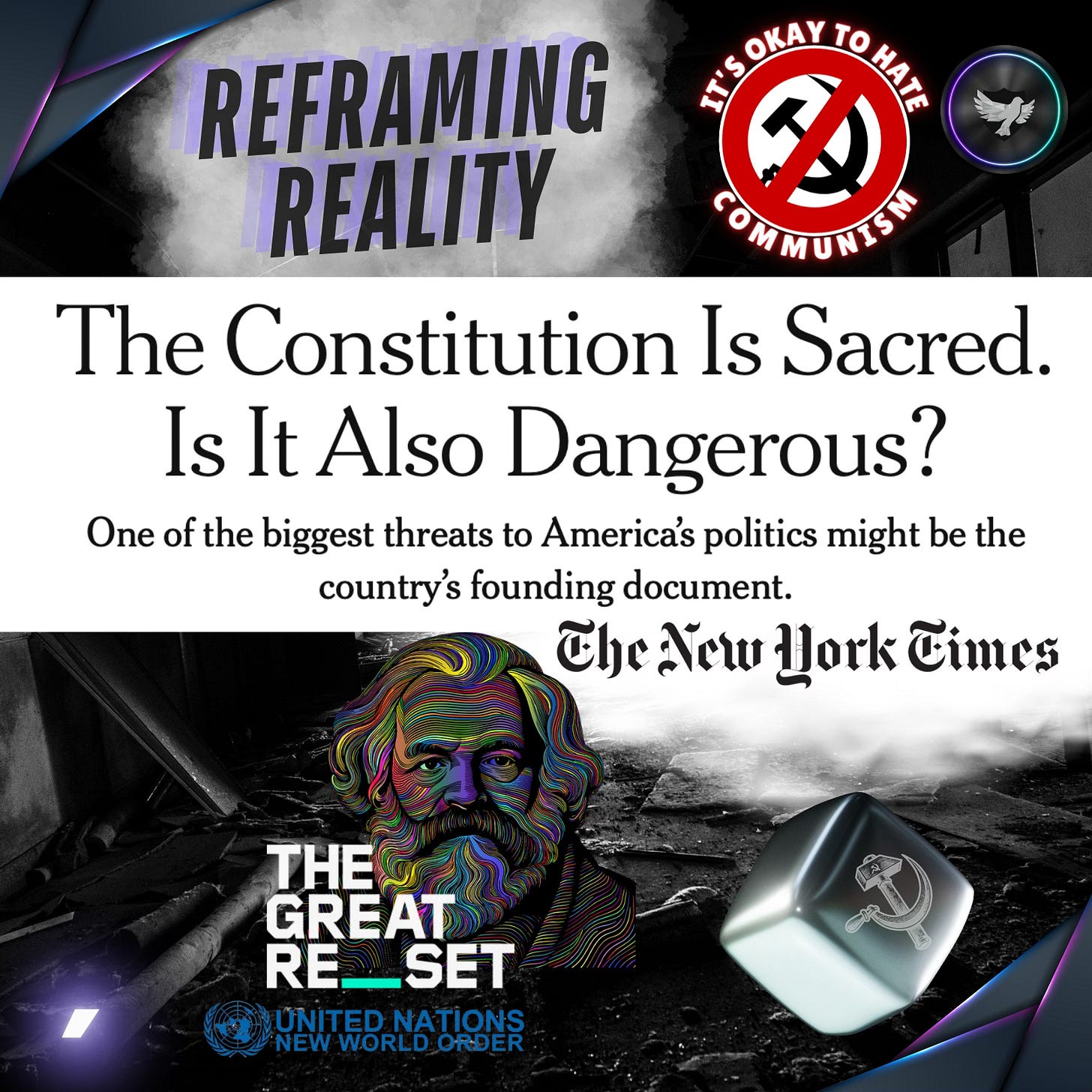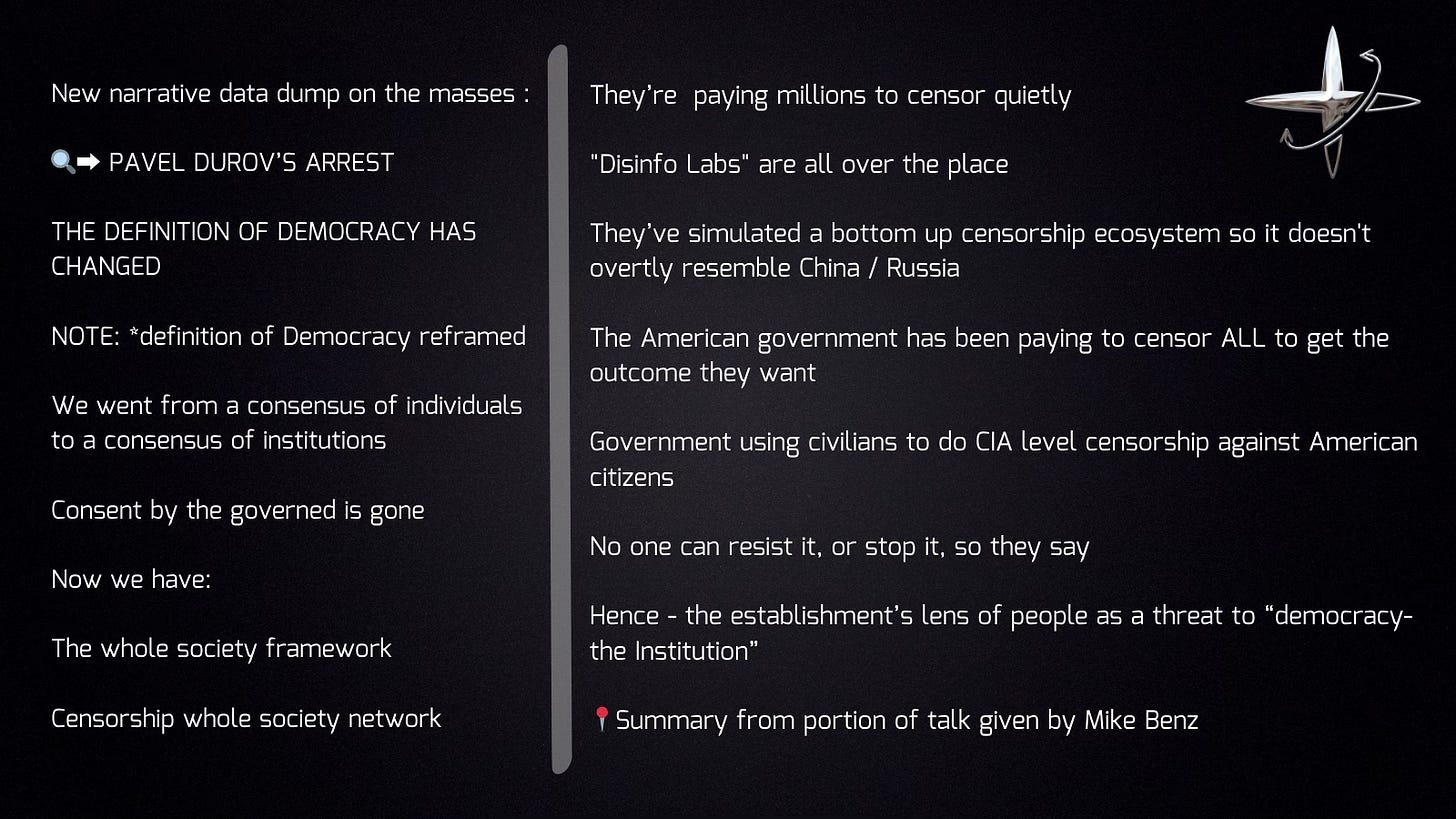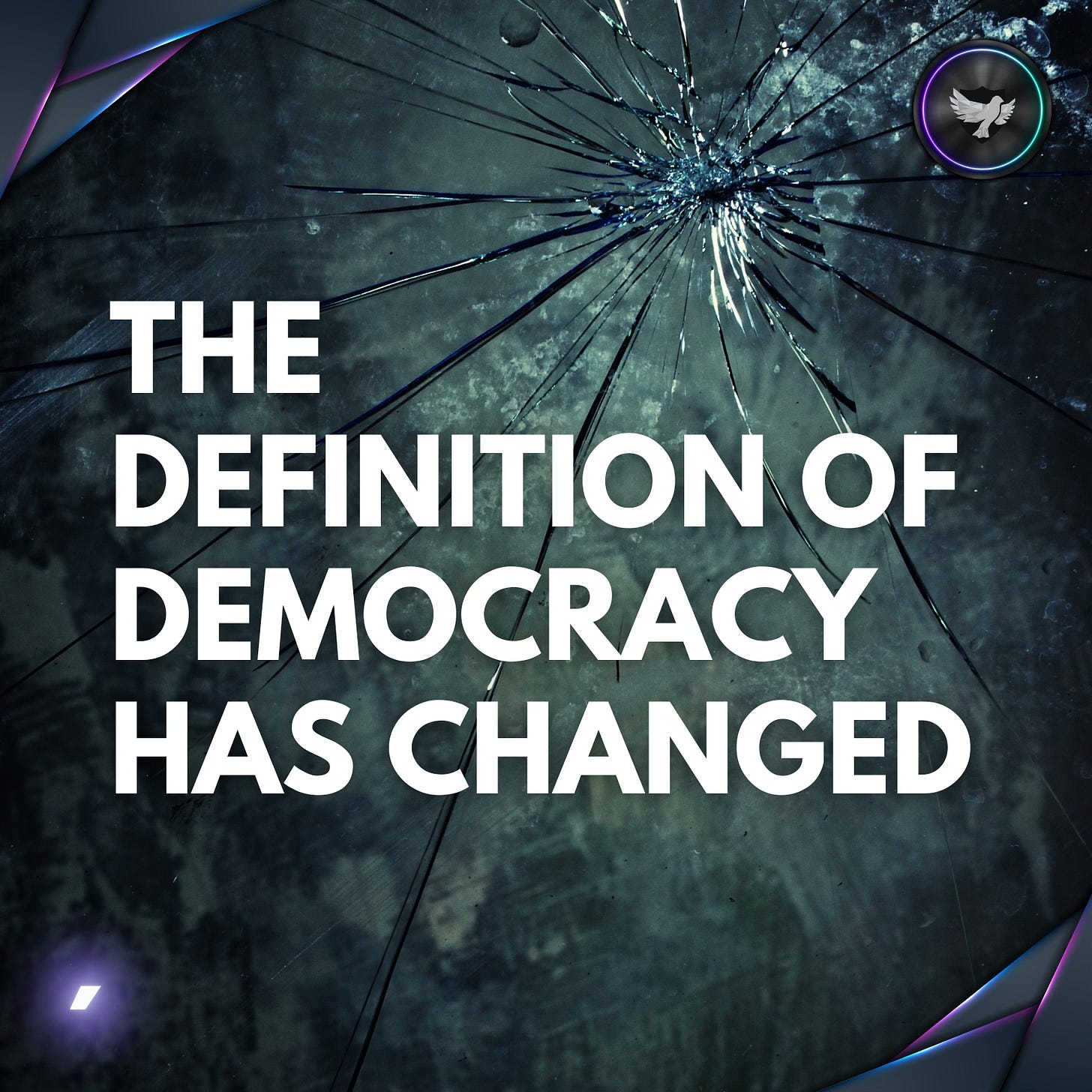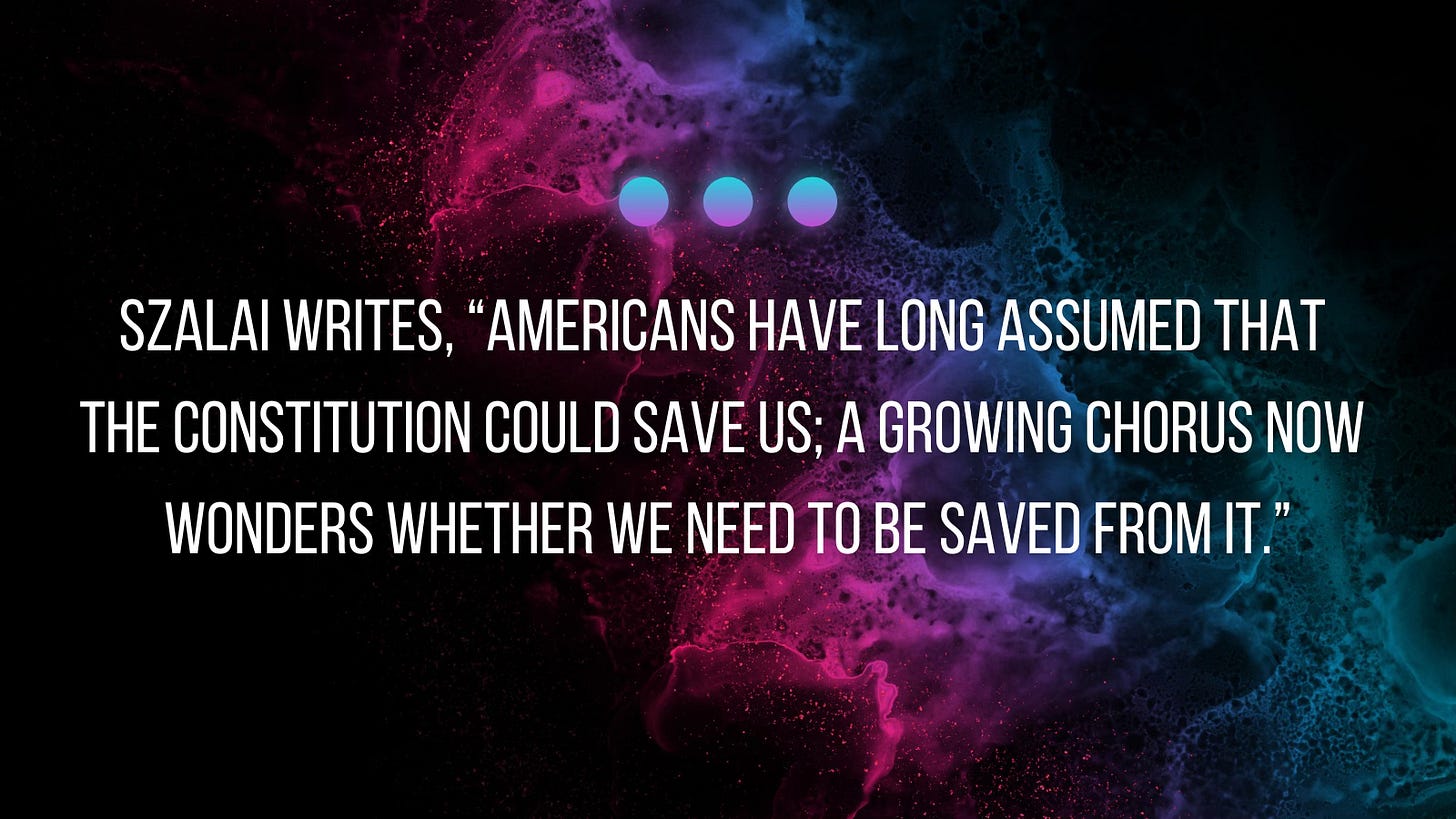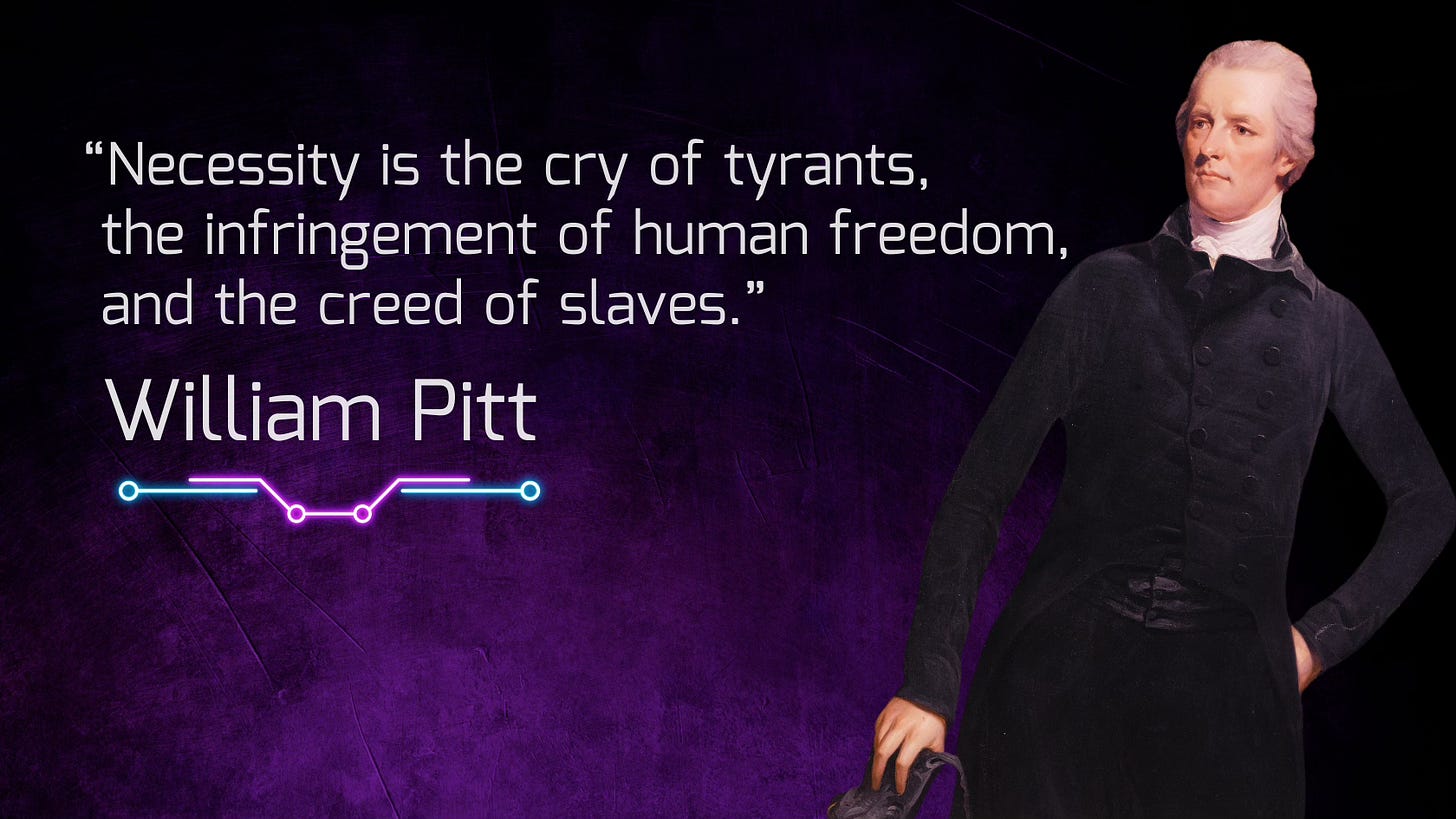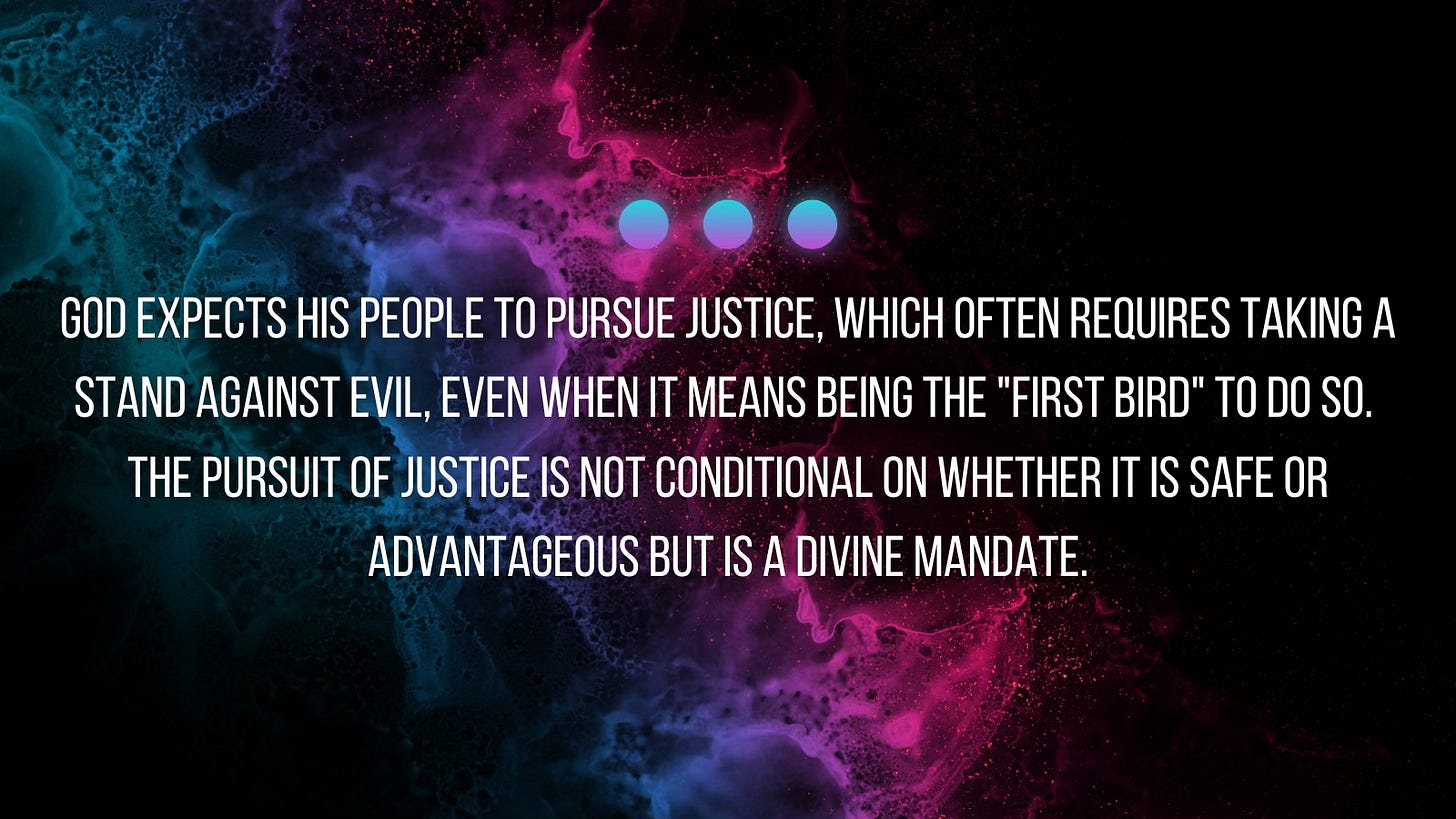Treason: The New York Times Hates The Constitution and Americans
Make no mistake, THEY AIM TO REFRAME REALITY
Once they’ve convinced you that everything you have known is a lie,
you are ready to believe anything. Make no mistake, they aim to reframe reality.
In this article:
1. The New York Times: Enemy of The America
2. More Examples of Institutional Capture
3. Does Slavery Make The Constitution Illegitimate?
4. Bonus Material: The Rise of The "Paper of Record”
5. What Has God Said?
“Fifty years ago, the Times ridiculed Marcuse…” By 2008, the Times’ Establishment voices had been supplanted by a new generation of radicals hopped up on grievances and the intoxicating doctrine of Marcuse’s mixed-Marxian arts. Diversity programs and left-wing activism dominated the new Times culture. “It was, in the words of another writer, a Revolution.”1 (Rufo, pp. 55, 56)
The New York Times has become the paper of record for the Marxist Revolution; a counter-institution to control, as Neo-Marxian academic agitator Herbert Marcuse put it, “the great chains of information and indoctrination.”2 These days, the Times reads more like the official mouthpiece of the Chinese Communist Party. See for yourself.
The defenders of free speech have become its enemies. Radical Marxist comrades have captured almost every crucial institution, redefined democracy as a danger, infiltrated all three branches of the federal government, and now they have openly marked The Constitution for cancellation. They not only hate the American way of life, they hate Americans. They hate YOU.
Their most recent attack on the U.S. Constitution paradoxically proclaims,
“One of the biggest threats to America’s politics might be the country’s founding document.”
The NYT has long prided itself on its mission to, “seek the truth and help people understand the world” and to make “…all of society stronger and more just.”3 But, today, The Times is no longer a seeker of truth and evidently is working against the founding principles and interests of America. I think you’ll feel the same sense of urgency we feel when you see what they're writing over there.
The article makes several stunningly anti-American statements. How ‘bout this doozy right out of the gate, The Constitution is “antidemocratic and, in this day and age, increasingly dysfunctional.”4
The article is a proud and open condemnation of the founding document of the freest nation the world has ever seen.
The writer of the piece, Jennifer Szalai, who holds a master's degree in international relations from Fabian socialist stronghold, the London School of Economics, claims that the Constitution is actually “undemocratic” and the arch enemy of something they call “our democracy.”
Szalai quotes dean of Berkeley’s law school, Erwin Chemerinsky from his new book, No Democracy Lasts Forever, who describes the Trump phenomenon as, “failures [that] stem from the Constitution itself.” Chemerinsky, calls for a constitutional convention saying that the Constitution has put the country “in grave danger.”5
Szalai writes, Chemerinsky believes “that the Constitution could hasten the end of American democracy,” also saying “what ails the country’s politics [is] the founding document.” This is not an isolated idea, particularly on the Left. “Books and op-eds critiquing the Constitution have proliferated…Scholars are arguing that the Constitution has incentivized…a “Tyranny of the Minority.”6
You’d be hard pressed to find a more contradictory concept than a “tyranny of the minority.” But that is exactly how these post-Marxian Rousseauian subjectivists see the world. They feel they should be free to change everything, including the basic definitions of words like “democracy” “freedom” “extremist” and “tyranny” when it's expedient for their needs to do so.
Szalai writes, “Americans have long assumed that the Constitution could save us; a growing chorus now wonders whether we need to be saved from it.”7
If these ideas seem strange to you, that’s because they are. This movement is shot through with contradictions and opportunistic radicals who will lie and distort with the greatest of ease.
While criticizing Donald Trump in an official White House statement, Biden Administration spokesman Andrew Bates called the Constitution a “sacrosanct document” and said, “Attacking the Constitution and all it stands for is anathema to the soul of our nation and should be universally condemned.”8
The truth is that Bates also played a central role concealing Biden’s obvious cognitive decline from the American people — which is what we define as a clear and present threat to our national security, our democracy, if you prefer. But it's no problem for the Marxists to outright lie to the people. According to Bates, President Biden, "brought honesty and integrity back to the White House."9 No problem. As mass murderer Vladimir Lenin wrote, the purpose of communism must be achieved by any means necessary.
Freedom depends on freedom of speech and for those who love truth and liberty to be willing to defend it. Because, as history reveals, quite often those who claim to be the defenders of democracy and free speech often become its greatest enemies. Manipulating public opinion, suppressing dissent, undermining democratic principles, redefining the very meaning "freedom" itself, and shaping narratives to serve political, economic, and ideological interests has been a high priority for media tycoons and powerful elites.
We must be engaged, paying close attention, and minding the institution that claims to be serving the needs of America lest it become too late and we lose our liberty from sheer disinterest. That would be the most un-American thing ever.
God has spoken on this type of rejection of His good gifts.
“And I brought you into a plentiful land to enjoy its fruits and its good things. But when you came in, you defiled my land and made my heritage an abomination.” (Jeremiah 2:7)
Through His prophet, God reminds His people of the good gifts He has given them and chastises them for disregarding and defiling the blessings and freedom He gave them and warns them of a severe event coming in the near future when they would be taken captive by a foreign nation and forced to live in their city and by their way of life. (See below for more on God’s eternal truth about matters of national loyalty)
More examples from American Institutions
Since at least 2016, it has become common for the institutional controllers of academia, the cultural engineers in the media, including but not limited to The New York Times, corporations, Big Tech, and administrative liars in the federal government to posture themselves as the omnibenevolent bearers of eternal truth and at the same time victims of an existential “threat to our democracy.”
After Donald Trump’s election in 2016, these institutions were reframing democracy as “a mistake” because it allowed “someone like Trump” to ascend to power.
The Journal of Democracy, published by the National Endowment for Democracy, suggested as early as 2017 that Trump’s election was a result of ignorant voters not knowing what’s best for them. The journal’s authors are regularly gobsmacked by Trump’s “illegitimate” rise to power, saying that the election did not reflect “valid political norms and values.” They suggest that democracy is no longer viable because it is failing to produce the right kind of leaders which is unfair. Unfair for whom? 10
Trump is "at heart, a dictator...this has happened in many of the countries in eastern Europe and Latin America that have slipped into pseudo-democracy or autocracy." In other words, if we don’t stop this now, Trump will carry America into authoritarianism.11
CleanTechnica articles argued that Trump's election was illegitimate because it was fueled by the spread of conspiracy theories and false information which persisted throughout his presidency. They suggested that the advent of social media platforms has created an atmosphere where democracy, specifically the people, the ones who vote, can no longer be trusted to make the right choices.
On August 27, 2024, CleanTechnica published an article titled: Democracy is Collapsing on Itself from a Massive Media Crisis. Zachary Shahan writes,
"My first article about Donald Trump running for president (in 2016) was titled 'Could the US Really Elect a Conspiracy Theorist?' The answer, as we all know, was yes. And we can see where that got us on January 6, 2021... Even if you support Trump, you have to acknowledge that he loves to promote conspiracy theories..."12
In another Journal of Democracy article from the July 2024 issue: When Democracy Is on the Ballot, Michael Ignatieff opined,
“...All democracies could use serious institutional reform, but we will not begin unless we abandon the illusion that democracy’s problems would be solved if we could just defeat authoritarian populists at the ballot box. It is our institutions, not just the players, that need changing.”13
Does Slavery Make The Constitution Illegitimate?
Szalai, a young Canadian-born white woman, deploys the device of the 18th century transatlantic slave trade as an argument against the Constitution’s legitimacy. Proper historical analysis requires the understanding of events within their original contexts. Two bad problems with her approach are the fallacy of presentism and a fundamental lack of understanding of the principles and purpose of the Constitution.
Presentism
Presentism, or the fallacy of anachronism, is a type of historical fallacy where a person judges the past through the moral, cultural, and intellectual standards of the present. Szalai’s biases lead her to commit the fallacy of historical reductionism, the oversimplification of people and events in order to fit them into modern categories or ideologies.
Szalai’s own elitist, anti-white bias undermines her argument against the Framers as narrow-minded, morally compromised white men. Her moral relativism of applying a contemporary Western elitist view of gender equality to the Framers of the Constitution is intellectually dishonest and manipulative to her readers.
Szalai’s article is more a reflection of her present biases than an accurate critique of past realities.
Does Slavery Invalidate the Constitution?
Secondly, the existence of the transatlantic slave trade is not a valid argument against the legitimacy of the U.S. Constitution.
The effects of postmodernism, or irrational subjectivism, on academia and journalism have caused the proliferation of some severely flawed arguments against the Constitution, typically fronted by wokeists.
They argue that the Constitution is morally illegitimate because: Some of the Constitution's framers were slaveholders, and the Constitution did not immediately abolish slavery.
Szalai’s argument fails to consider the Constitution's role as a foundational legal document designed to balance competing interests in a pluralistic society, setting the stage for the gradual realization of its core principles of liberty and equality.
Pragmatic Compromise
The U.S. Constitution was created in a context where slavery was already an established institution, particularly in the Southern states. The framers of the Constitution faced the challenge of uniting a diverse set of colonies into a single nation.
To achieve this goal, compromises were necessary, including those related to slavery. The three-fifths compromise and the allowance for the continuation of the slave trade until 1808 were concessions to ensure the participation of the Southern states in the new federal system.
However, these compromises do not negate the legitimacy of the Constitution because they were part of a broader strategy to lay the groundwork for a unified nation that could eventually address slavery through lawful means.
Framework for Ending Slavery
The Constitution established a framework for the eventual abolition of slavery. Mechanisms such as the amendment process allowed the Constitution to be adapted and expanded which would be crucial in allowing future generations to rectify the institution of slavery.
The 13th Amendment, which abolished slavery, was made possible precisely because the Constitution allowed for such amendments.
Declaration of Universal Principles
"We the People," not “the approved institutions.” The Constitution's preamble and its underlying principles reflect a commitment to universal ideals of justice, liberty, and equality. While these principles were not immediately extended to all people, they created a moral and legal standard against which slavery could be judged as immoral and illegal—a standard that never existed anywhere in the world before.
The Declaration of Independence, the philosophical and theistic foundation of the Constitution, asserts that "all men are created equal" and endowed with "unalienable rights” — the very basis for future arguments against slavery that were used by American abolitionists.
Frederick Douglass and Abraham Lincoln argued that the Constitution was fundamentally an anti-slavery document because it established a government based on natural rights, even if its full realization required time and struggle.
The Growth of The American Republic
Tocqueville recognized that the American Republic was founded on principles meant to be progressively realized. The Constitution is a framework for establishing Liberty and reforming the laws of the land through democratic processes. The Constitution’s legitimacy is not a product of eternal perfection, but the creation of fallible men who knew their limitations, loathed tyranny, and were determined to be guided by principles higher than their own immediate desires.
The experiment of popular sovereignty and the Constitution’s ability of self-correction embody the aspirations of the American people for justice and equality and the understanding that the nation’s character would develop over time. And that’s exactly what happened, for the best, which cannot be debated except by the most cynical left-wingers committed to delusion of socialism.
The transatlantic slave trade, while morally reprehensible, does not invalidate the Constitution's legitimacy because the Constitution was crafted to permit the very legal mechanisms that led to the abolition of slavery.
If we want to understand why some people seem to hate the Constitution, perhaps we can take a cue from John Adams, and many others, who understood that the Constitution was made only for a "moral and religious people" and would be inadequate for any other, like those who choose to place their ultimate faith in the state.
The Constitution was designed to work in tandem with the moral development of society, which was most assuredly influenced by Christian teachings on human dignity and natural law. William Wilberforce, who was key in the abolitionist movement, interpreted the Constitution and its principles as consistent with a moral imperative to end slavery.
The existence of the transatlantic slave trade does not invalidate the legitimacy of the U.S. Constitution. On the contrary, the Constitution was an intentionally crafted framework capable of adapting to and addressing social and moral injustices over time. Its foundational principles of liberty and justice, its pragmatic compromises to form a unified nation, and its mechanisms for legal and constitutional change provided the means for the eventual abolition of slavery.
To argue otherwise, as Szalai and her several supporting references have attempted, is to misunderstand the Constitution’s purpose to secure God given human rights and to be a constant reflection of the people who tend to it in every age and their aspirational ideals of a nation committed to liberty and justice for all.
Bonus Material: The Rise of The "Paper of Record”
The New York Times is often referred to as the "newspaper of record," a reputation it achieved through strategic alignment with influential figures in politics, business, and banking. Founded in 1851, the Times initially struggled to compete with more sensationalist rivals in the game of “Yellow Journalism.” When Adolph Ochs acquired the paper in 1896, he positioned the paper as the model of objectivity and integrity.
However, through privileged access, cultivation of close relationships with political and financial elites, and aligning its editorial stance with powerful interests, the paper became a primary tool of social engineering for those with power and influence.
Times maintained strong ties with key players in government, such as the Roosevelt and Kennedy administrations, and with business magnates like J.P. Morgan. This mutually beneficial arrangement allowed the Times to bolster its standing as the "paper of record" while often acting as a mouthpiece for powerful allies.
One of the most notorious controversies involved the Times' Pulitzer Prize winning Moscow correspondent, Walter Duranty. During the 1930s, Duranty’s coverage shaped the American perception of the Soviet Union and Communism. Duranty notoriously downplayed the horrors of the Holodomor, the man-made famine in Ukraine that resulted in millions of deaths, and parroted Stalinist propaganda, even denying the existence of the famine. Despite numerous eyewitness accounts and reports to the contrary, Duranty's dispatches served to misinform the Western public and bolster Soviet propaganda.
Duranty's coverage was not an isolated incident. Throughout the 20th century, the New York Times has been implicated in reporting Soviet and Nazi propaganda as fact. For example, the Times' Berlin correspondent, Guido Enderis, was criticized for his sympathetic portrayal of Nazi policies and his failure to report on the extent of the Holocaust in its early stages. The paper's editorial stance often reflected the influence of external political or corporate pressures, suppressing stories or spinning narratives to serve the interests of its benefactors.
The Times’ mishandling of the 1954 coup in Guatemala obscured the role of the United States in overthrowing a democratically elected government. More recently, during the Iraq War, the paper published unverified claims about weapons of mass destruction, and a long debunked public relations (propaganda) yarn about babies being thrown from their incubators by Iraqis at a Kuwait hospital.
The New York Times has demonstrated a pattern of aligning its reporting with the interests of those in power. Figures like Edward Bernays, the "father of public relations," were major players in the process of defrauding the public in the name of national security. Deeply influenced by his uncle Sigmund Freud's theories on the unconscious mind, Bernays, developed sophisticated methods of propaganda to manipulate mass opinion. For example, the "Liberty Torches" campaign devised by Bernays encouraged women to smoke as a sign of independence. Similarly, Bernays played a key role in renaming the U.S. War Department to the Department of Defense to soften public perceptions of military action and encourage Americans to support more war efforts.
Media and public relations have been a major shaper of reality and crafter of narratives favorable to elite interests. Authors like Antony Sutton and Carroll Quigley have extensively documented the influence of powerful financiers like the Round Table group, an elite network of British and American financiers and policymakers, who used media outlets, including the New York Times, to shape global affairs. Sutton's research suggests that this group was instrumental in financing both sides of conflicts and using media narratives to manipulate public opinion to suit their geopolitical aims. Quigley, in his book Tragedy and Hope, argued that these elites sought to establish a global system controlled by financial capital, utilizing media as a tool to legitimize and propagate their agenda.
The advent of radio and television in the mid-20th century marked a new era in the media's ability to shape public opinion on a global scale. Unlike newspapers, radio and TV offered immediacy and a sense of intimacy, allowing for real-time broadcasting of events and creating a powerful emotional connection with audiences. Leaders like Franklin D. Roosevelt leveraged radio through "fireside chats" to build public support, while figures like Edward R. Murrow used television to shape the national conversation during pivotal moments such as the McCarthy hearings.
However, just as newspapers had been used to advance particular agendas, so too were these newer mediums. Controlled by as few as five or six men at one time, networks became the gatekeepers of information for American citizens. This concentration of media power allowed for even greater control over public perception.
The internet, online news, podcast influencers, and social media have also become tools for those seeking to control and shape public consciousness. Since 2016, various institutions and groups shifted the definition of democracy from the "consent of the governed" to the "consent of the institutions," allowing for greater control by elites who position themselves as protectors of public order.
Organizations like the World Economic Forum, various think tanks, and certain media conglomerates have been at the forefront of advocating for restrictions on speech, often under the guise of combating misinformation or protecting public safety. This new paradigm suggests that free speech, long considered a pillar of democratic society, is now seen as a potential danger when it contradicts the prevailing orthodoxy or challenges institutional authority.
We are witnessing a subversive movement that seeks to undermine the foundational principles of life, liberty, and property enshrined in the Constitution by suggesting that free speech is a danger. When defenders of free speech become its enemies, the implications are severe. Tyrannical tactics have evolved in the digital age, but the goal remains the same: to control public consciousness and shape the future according to the interests of the Far-Left Marxian elites.
What Has God Said?
"Take care lest you forget the Lord your God by not keeping his commandments and his rules and his statutes, which I command you today, lest, when you have eaten and are full and have built good houses and live in them, and when your herds and flocks multiply and your silver and gold is multiplied and all that you have is multiplied, then your heart be lifted up, and you forget the Lord your God, who brought you out of the land of Egypt, out of the house of slavery." (Deuteronomy 8:11-14)
The phrase "lifted up" symbolizes a sense of self-sufficiency or entitlement that neglects to acknowledge God's provision and the freedom He gave them when He delivered them from slavery in Egypt.
“But when they had grazed, they became full, they were filled, and their heart was lifted up; therefore, they forgot me.” (Hosea 13:6)
Hosea echoes the earlier warning in Deuteronomy, describing how God’s people, once they had received and were enjoying the material blessings and prosperity, became prideful and forgot the Lord, the giver of all good gifts. (James 1:17)
“They did not keep God’s covenant, but refused to walk according to his law. They forgot his works and the wonders that he had shown them.” (Psalm 78:10-11)
This psalm recounts Israel’s history of disobedience, specifically how the people forgot God’s miraculous acts and blessings, leading to their downfall.
Let us learn form God’s eternal, unchanging truth that we are absolutely dependent on Him and that as a testimony of our faith and love for others, we must defend the principles of liberty wherever they are threatened.


